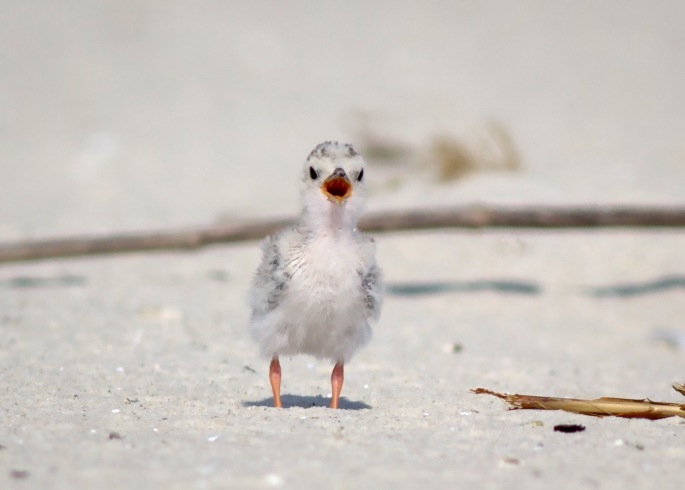This isn’t exactly about interpretation, but to my way of thinking about the world, everything is about interpretation, so it still fits pretty neatly in place.
(Photo of a small Least Tern chick by Katie Barnes, Birmingham Audubon’s Coastal Programs)

An organization that I’ve been involved with for a few years now, and as the president for the last 2, was faced with a very difficult challenge recently through, I might point out, no fault of their own. Earlier this summer while doing some routine bird nest discovery along Alabama’s coastline, the Birmingham Audubon coastal team discovered something truly tragic: hundreds of disturbed Least Tern nests. And these nests hadn’t been ruined by weather or predators (though both of these happen frequently on Alabama’s coastline).
The nests had been destroyed by volleyball playing shenanigans off the coast of Alabama’s Dauphin Island. A small sand island sits far enough off the island’s coast to avoid most predation by mammals, but not so far that it is out of reach of fools with boats. Coming upon this destruction was, for the Audubon staff, very disheartening. They’ve been working all year to protect Least Tern nests (and 10 other bird species in particular danger). To find something so carelessly, senselessly destructive was almost too much to bear.
But bear it they did, and with good common sense. My initial reaction was one of sadness, of frustration and, to be honest, of a hot, flashing anger at anyone stupid enough to do something like this. The staff reaction was, I’m quite sure not that much different than this, but their outward-facing position was one that included a plan to use this horrible event as a teaching moment. Least Terns (and other birds) need humans to leave them alone. The coastal staff installed symbolic fencing (it makes humans aware that the area should be left alone, but certainly doesn’t stop anyone interested in crossing it), made sure that the story made the local media and highlighted the reality that this has probably been happening for years, but had, until our team was able to visit the area regularly as the result of a grant, gone undocumented.
The result of that local article managed to hit the AP, then the New York Times, the BBC, People Magazine, National Audubon, and dozens of other news outlets. All the local TV stations carried it. Talk about getting the word out!
Birmingham Audubon’s Katie Barnes managed to see that there was a bright side to this very dark cloud: “The take-home message is our protection helps birds, education helps birds,” Barnes says.
My take home message for interpreters is this: Just because something terrible happens, don’t give up. Don’t show your anger unless it will help. Find a way to make the situation better, to have an impact. Sometimes, the very worst things that happen bring about some of the very best results.
Find out more about the story on National Audubon’s website: https://www.audubon.org/news/birmingham-audubon-saves-terns-after-beachgoers-destroy-hundreds-eggs?ms=digital-eng-social-facebook-x-20180800_fb_link&utm_source=facebook&utm_medium=social&utm_campaign=20180800_fb_link
